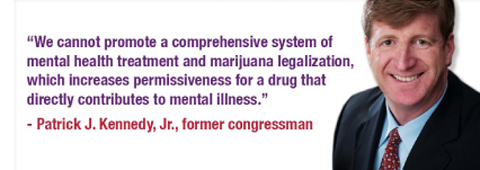
TAKING A STAND Kennedy's testimonial on the SAM website. |
Since leaving Capitol Hill in 2010, former Rhode Island Congressman Patrick Kennedy has devoted much of his energy to mental health concerns.
But this week, he took up a new and unexpected cause: liberal opposition to the legalization of marijuana.
On January 10, as the Phoenix hits the streets, Kennedy is set to launch Smart Approaches to Marijuana (SAM) in Denver — ground zero for the legalization movement.
Voters in Colorado and Washington legalized pot in November. And it was in the aftermath of the election that the small cadre of lefty opponents first pierced the national consciousness.
Ed Gogek, a self-described "lifelong partisan Democrat" and physician who serves on the board of Keep AZ Drug Free, published an op-ed in the New York Times arguing that his party should not embrace legalization.
Democrats have long pilloried Republicans for ignoring science, he wrote, but they've done just that when it comes to marijuana: liberals "insist weed isn't addictive, despite every addiction society saying it is."
Medical marijuana laws, he argued, are also a sham. They were sold as a salve for the seriously ill. But in Oregon and Colorado, he wrote, 94 percent of cardholders get marijuana for pain, "easy to fake and almost impossible to disprove."
I've "spent 25 years as a doctor treating drug abusers, and I know their games," Gogek wrote. "They're excellent con artists."
Kennedy, who has famously struggled with alcohol and drugs, is intimately familiar with addicts' obfuscations. But it is a sensitivity to the perils of abuse that drew him to the cause.
"I'm not just a casual bystander," he told the Washington Post. "I'm ready to stake my reputation. I still consider myself having a public responsibility. The weight of evidence is so overwhelming that I don't think it's responsible not to speak out on this."
Kennedy acknowledges the long odds he faces on the left. Liberals are attracted to legalization because it carries a bit of anti-establishment glamor, he suggests, and looks like a compelling alternative to incarceration.
But the former Congressman is offering up a message that, he hopes, will be appealing to Democrats. He is emphasizing prevention and treatment. And the SAM web site warns that widespread legalization could be a bonanza for the interest most likely to control a burgeoning marijuana industry: Big Tobacco.
The organization also suggests that those arrested for marijuana possession should not have the humiliating stain of a criminal record, which can seriously impact job and housing prospects. Instead, SAM's leaders argue, they should face mandatory health screening and marijuana education, with referrals to treatment or social services if needed.
This is Kennedy's approach at its most interesting. He is, in effect, attempting to chart a "third way" between legalization and demonization of marijuana.
Keven Sabet, a former drug policy advisor in the Clinton, Bush, and Obama administrations who co-founded SAM, says the organization is trying to inject nuance into a conversation that has resembled a shouting match until now.
Robert Capecchi, a legislative analyst with the Washington-based Marijuana Policy Project, isn't buying it. He says the mandatory assessments and education SAM advocates would add to the already ballooning cost of a failing war on drugs. They'd also be an affront to civil liberties, he argues — the equivalent of forcing an intervention on anyone who sips a cocktail.